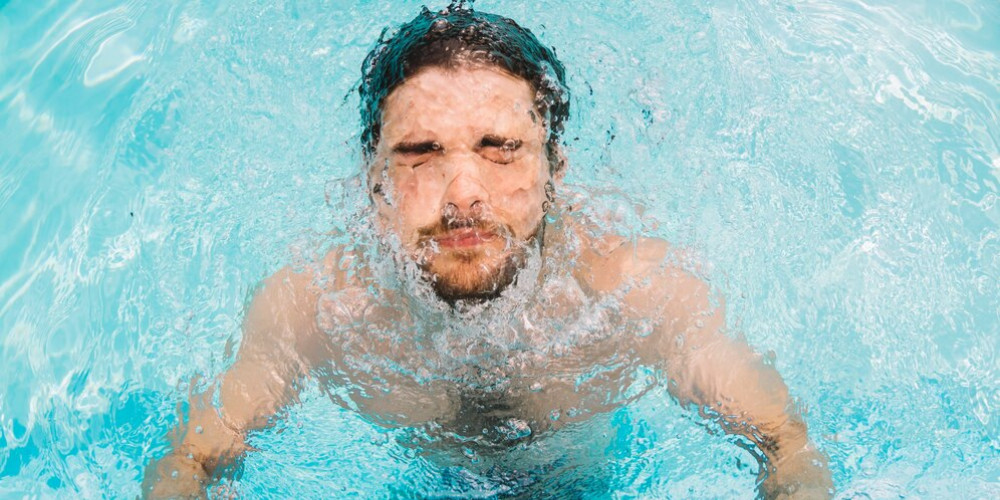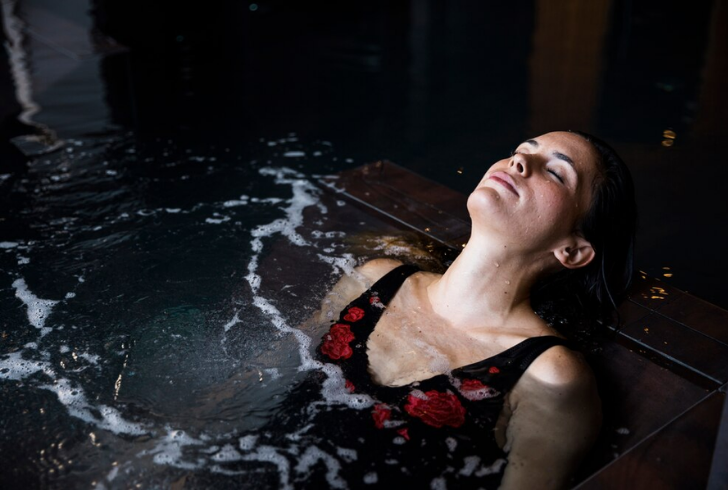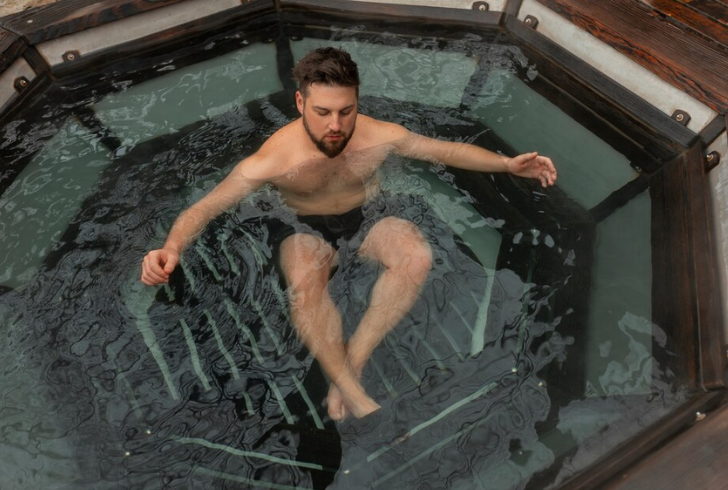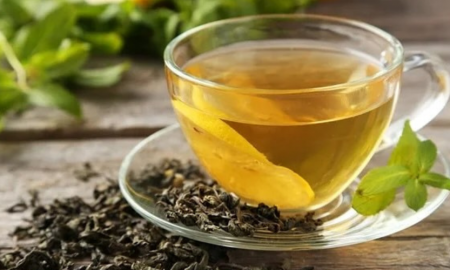
Cold Plunge Therapy | Should You Buy a Cold Plunge Tub?

In recent years, a wave of icy enthusiasm has swept across the health and wellness scene: cold plunge therapy. Taking a dip in a frigid tub or braving the icy embrace of a winter lake might seem like a recipe for discomfort, but a growing number of devotees swear by its transformative effects.
From enhanced mood and reduced inflammation to improved blood sugar control, the purported benefits of cold plunge therapy are as diverse as they are intriguing. But before you suit up for a polar plunge, it’s important to understand the science behind this practice and explore its potential advantages and limitations.
How Cold Plunge Therapy Works

Freepik | Entering cold water triggers the sympathetic nervous system, releasing adrenaline and noradrenaline.
Our bodies are finely tuned machines, constantly working to maintain a stable internal temperature. When we enter frigid water, many physiological responses are triggered. The initial shock activates the sympathetic nervous system, causing a surge of adrenaline and noradrenaline. Heart rate and breathing quicken while blood vessels constrict to prioritize warmth to vital organs.
As we acclimate to the cold, our bodies begin to generate heat through a process called shivering. This involuntary muscle activation burns calories and can temporarily boost metabolism. Cold exposure may also influence the activity of brown adipose tissue, a type of fat known for its heat-generating properties.
Potential Benefits and Risks to Consider

Instagram | katemangostar | Cold water immersion can boost mood and help manage stress by releasing neurotransmitters.
While research on cold plunge therapy is still evolving, some promising evidence suggests potential benefits:
-
Enhanced Blood Sugar Control: Studies indicate that cold exposure may improve insulin sensitivity, aiding the body’s ability to manage blood sugar levels.
-
Reduced Inflammation: Cold therapy has been shown to decrease inflammation markers, potentially offering relief for chronic inflammatory conditions like arthritis.
-
Improved Mood and Stress Management: Cold water immersion may trigger the release of mood-boosting neurotransmitters like endorphins and dopamine, contributing to feelings of well-being and potentially aiding in stress management.
-
Faster Muscle Recovery: Some studies suggest cold baths might help reduce muscle soreness and fatigue after exercise.
However, it’s crucial to acknowledge potential risks:
- Cardiac Strain: The sudden shock of cold water can be overwhelming for the cardiovascular system, particularly for those with pre-existing heart conditions.
- Cold Injuries: Prolonged exposure to frigid temperatures can lead to hypothermia or localized injuries like frostbite.
- Unrealistic Expectations: While cold therapy might offer some benefits, it’s not a magic bullet for weight loss or chronic disease management.
Tips for Beginners

Freepik | Start with cool showers or brief dips in cold water, gradually increasing duration and intensity.
If you’re intrigued by the idea of cold plunge therapy, here are some steps to ensure a safe and positive experience:
-
Consult Your Doctor: Always get a green light from your doctor before starting any new wellness practice, especially if you have any underlying health concerns.
-
Start Slow: Don’t dive headfirst into an icy bath. Begin with cool showers or short dips in a cold plunge tub, gradually increasing the duration and intensity over time.
-
Listen to Your Body: Pay attention to your body’s signals. If you experience discomfort, dizziness, or difficulty breathing, get out of the cold water immediately.
-
Focus on Breath Control: Deep, mindful breathing can help manage the initial shock response and promote relaxation.
-
Buddy Up: When starting, consider plunging with a friend or in a group setting for added safety and support.
Remember: Consistency is key. Regular cold exposure allows your body to adapt and potentially reap the long-term benefits of cold plunge therapy.
A Chilling Choice for Well-being
Cold plunge therapy might not be for everyone, but for those willing to embrace the invigorating chill, it could be a valuable addition to a well-rounded wellness routine. By approaching this practice with caution and informed knowledge, you can unlock the potential benefits of cold water immersion and experience a newfound sense of physical and mental well-being.
More in Body
-
`
How the ‘Ozempic Effect’ Is Changing Clothing Sizes Across the U.S.
Retailers across the U.S. are noticing a striking change on their racks. Plus-size apparel, once in constant demand, is showing up...
September 27, 2025 -
`
Fat Jabs May Cure Cocaine Addiction and Boost Heart Health, New Study Finds
What if the same jab that helps you lose weight could also help you kick a cocaine habit? Sounds wild, but...
September 21, 2025 -
`
Dwayne Johnson Shocks Fans With Dramatic Weight Loss Transformation
Dwayne “The Rock” Johnson stunned the crowd at the 2025 Venice Film Festival with a slimmer look that set social media...
September 20, 2025 -
`
Dwayne ‘The Rock’ Johnson Stuns Fans With Slimmed-Down MMA Fighter Look
Dwayne ‘The Rock’ Johnson isn’t just flexing muscles anymore. In “The Smashing Machine,” Dwayne Johnson strips down the bulk, sheds his...
September 13, 2025 -
`
Here’s How Fat-Blocking Green Tea Microbeads May Aid Weight Loss
Scientists are exploring an innovative way to reduce fat absorption in the body—tiny edible beads made with green tea, vitamin E,...
September 12, 2025 -
`
Why the Heart Is Slightly to the Left and Not Perfectly Centered
The heart is one of the most vital organs in the body, yet its placement often raises questions. Many assume it...
August 16, 2025 -
`
Ozzy Osbourne’s Most Shocking and Beloved Pop Culture Moments
Few figures in rock history have carved out a legacy as vivid and unpredictable as Ozzy Osbourne. Beyond his groundbreaking work...
August 10, 2025 -
`
Are Mono Diets Worth It – or Just a Dangerous Trend?
As summer brings on the pressure to slim down fast, the internet lights up with diet trends promising instant results. One...
August 3, 2025 -
`
Why Motivation Is Essential for Sustainable Fitness Success
Motivation isn’t something that shows up when it’s convenient—it’s something that needs to be built, shaped, and sustained. Many people struggling...
July 27, 2025










You must be logged in to post a comment Login